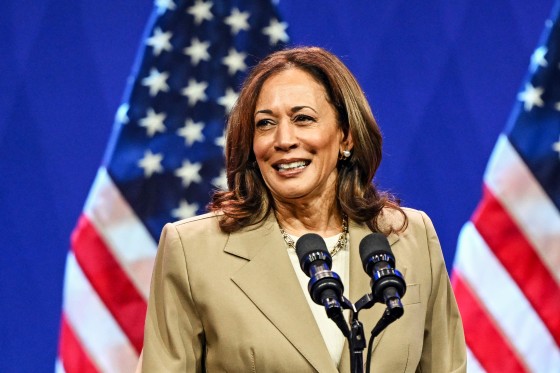Any Democrat wishing to challenge Vice President Kamala Harris for the presidential nomination has only days to secure the necessary support, according to nominating rules the party approved Wednesday, which laid out plans for an unusual pre-convention nominating vote scheduled for early next month.
Candidates have until Saturday to declare their candidacies and until Tuesday to gather the needed support from hundreds of delegates to make the ballot alongside Harris at the virtual roll call vote. Democrats have given themselves an Aug. 7 deadline to conduct the roll call to avoid potential legal issues.
“We understand that this is an unprecedented situation, but we will accomplish it together,” said Minyon Moore, a veteran Democratic strategist and Harris ally who is chairperson of the Democratic National Convention, which begins Aug. 19 in Chicago.
No major Democrat has even hinted at plans to run against Harris, who has quickly consolidated support since President Joe Biden withdrew from the race and endorsed her.
The compressed timeline is also affecting Harris’ search for a vice presidential running mate, which might need to be completed in just two weeks.
More than three-quarters of pledged delegates to the Democratic National Convention have already endorsed Harris, according to an NBC News tally as of Wednesday afternoon, with no obvious pockets of opposition from any parts of Democrats’ vastly diverse coalition.
But Democrats are eager to avoid making their nomination process look like a coronation for Harris, promising an open and fair process. All it takes for someone else to run are signatures from at least 300 delegates (with no more than 50 from any one state) to have a chance at making the nomination ballot.
The timeline is incredibly restricted because Democrats have, for months, been planning to nominate their candidate early to avoid potential legal issues around an Aug. 7 ballot access deadline in Ohio. The Republican-controlled state Legislature passed a fix to move the date back, but the fix won't go into effect until September.
Ohio’s Republican secretary of state says the new law resolved the deadline issue entirely. But Democrats don't trust him and fear litigation from outside conservative groups.
“Failure to certify both nominees in advance of each state’s ballot deadlines opens us to very real potential litigation,” Pat Moore, a lawyer for the Democratic Party, said during Wednesday’s meeting of the Convention’s Rules Committee. “Republicans will use this moment to do what they do, to sue, to try to bar us from the ballot or try to disqualify our voters.”
Former President Donald Trump’s campaign has already filed a legal complaint claiming the handover of Biden’s campaign to Harris is illegal. The conservative Heritage Foundation is actively seeking plaintiffs in Ohio. And top Republican lawmakers like House Speaker Mike Johnson of Louisiana have said they expect litigation to try to trip up Democrats.
Democrats say they feel confident they can win a legal fight if they formally nominate their candidate after Aug. 7 but worry about creating a precedent Republicans could use to try to undermine the outcome of the November election.
“If we take chances with state processes and deadlines, Republicans could make the same argument to challenge Democratic votes in the post-election process, too,” Moore said.
The basics of the virtual roll call process have been outlined since May, but they had to be revisited after Biden stepped aside in favor of Harris.
The roughly 200 members of the convention’s Rules Committee met virtually Wednesday to consider the details of the virtual roll call plan and its timing and voted 157-3 to officially adopt it.
Under the plan, the window for other candidates to declare their bids for the nomination starts Thursday and closes at 6 p.m. ET Saturday. Candidates then have until 6 p.m. ET Tuesday to meet the 300-signature threshold of support from delegates, which represents about 6% of all delegates to the convention.
Rules Committee co-chair Leah Daughtry said the threshold, which has been in place since the 1990s, represents a “serious but modest” level of support — ensuring candidates have broad support within the party without making the barrier too difficult to meet.
If Harris is the only candidate, delegates will start voting in the virtual roll call Aug. 1. If there are multiple candidates, the party will allow “several days” for the candidates to make their cases to the delegates and the public, but voting would still begin Aug. 3.

